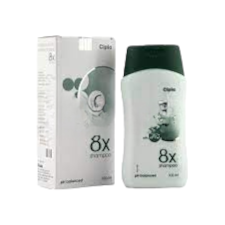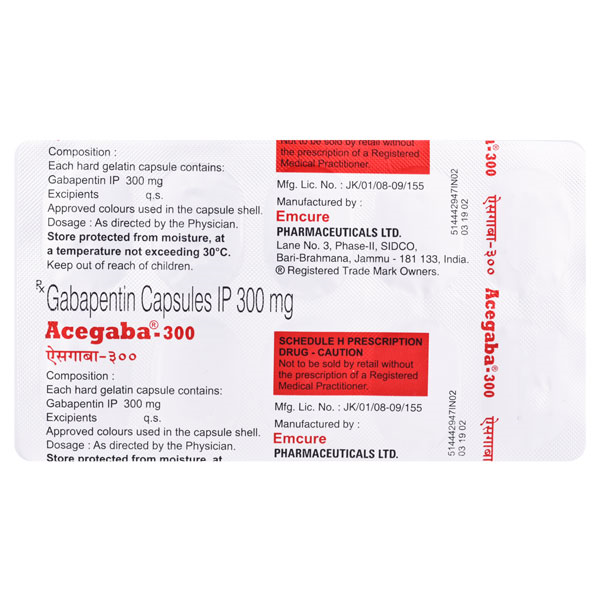ACEGABA 300MG CAPSULES 10S
KEY BENIFITS,
- Seizure Control: Gabapentin helps control seizures by stabilizing electrical activity in the brain.
- Neuropathic Pain Relief: It can alleviate neuropathic pain by modulating pain signals in the nervous system.
₹192.30
Compare1. Product Introduction:
- Name: Acegaba 300mg Capsules 10S
- Composition: Gabapentin 300mg
- Type: Anticonvulsant, also used for neuropathic pain
- Form: Capsules
Acegaba 300mg Capsules belongs to the anti-epileptic group of medicines. You may take it with or without food, but it is important to take this medicine at the same time each day to get the most benefit. The exact dose and duration of treatment will depend on your condition and how you respond to it. Your doctor will probably start this medicine at a low dose and increase it gradually. It may take a few weeks for the medicine to work properly. Follow your doctor’s instructions and continue taking it regularly until your doctor advises you to stop. Do not miss any dose, otherwise, your condition may worsen.
Most people taking Acegaba 300mg Capsules do not experience any side effects. The most common ones are feeling sleepy, dizzy, or tired (fatigue). These are usually mild and go away by themselves as your body gets used to the medicine. Most side effects are not serious and do not need medical attention. Talk to your doctor if any of the side effects persist or worry you.
You should avoid drinking alcohol along with this medicine as it may lead to excessive sleepiness and dizziness. Let your doctor know right away if you develop any unusual mood changes like anxiety, agitation, depression, or thoughts about harming yourself.
Before taking eAcegaba 300mg Capsules, you should tell your doctor if you have any kidney-related problems or if you are more than 65 years old. Your doctor may prescribe a different dose in such people. Women who are pregnant, breastfeeding, or planning to become pregnant should also consult their doctor before using this medicine.
2. Uses:
- Seizures: Gabapentin is commonly used as an adjunctive therapy in the treatment of partial seizures in adults and children.
- Neuropathic Pain: It is also prescribed for the management of neuropathic pain conditions such as diabetic neuropathy, postherpetic neuralgia (nerve pain following shingles), and other chronic pain syndromes.
3. Benefits:
- Seizure Control: Gabapentin helps control seizures by stabilizing electrical activity in the brain.
- Neuropathic Pain Relief: It can alleviate neuropathic pain by modulating pain signals in the nervous system.
4. Side Effects:
- Common side effects may include drowsiness, dizziness, and fatigue.
- Other potential side effects include peripheral edema (swelling of the extremities), ataxia (lack of coordination), and gastrointestinal disturbances.
- Rare but serious side effects may include severe skin reactions (Stevens-Johnson syndrome), and an increased risk of suicidal thoughts.
It is crucial to report any unusual or severe side effects to a healthcare professional.
5. Drug Interactions:
- Gabapentin may interact with certain medications, and it’s essential to inform your healthcare provider about all the drugs you are taking.
- Interactions may occur with antacids containing aluminum and magnesium, morphine, hydrocodone, and other medications affecting the central nervous system.
- Alcohol and some medications that cause sedation may increase the risk of drowsiness when combined with Gabapentin.
6. Precautions:
- Inform your doctor about your medical history, especially if you have a history of kidney disease.
- Abruptly stopping Gabapentin may lead to withdrawal symptoms, and the dosage should be tapered down under medical supervision.
7. Warnings:
- Gabapentin may cause an increased risk of suicidal thoughts or behavior, and patients should be monitored for any changes in mood or behavior.
- It is essential to follow the prescribed dosage and not to self-adjust the medication without consulting a healthcare professional.
Note: This information is a general overview and not a substitute for professional medical advice. Always consult with your healthcare provider for personalized guidance based on your health condition and medical history.
SAFETY ADVICE

Alcohol

Pregnancy

Breast feeding
Baby should be monitored for excessive sleepiness and weight gain.

Driving

Kidney

Liver
| Weight | 0.5 kg |
|---|---|
| Dimensions | 10 × 10 × 10 cm |
Related products
-
Medicines
8X Shampoo 120ML – Ciclopirox (1% w/v) & Zinc Pyrithione (1% w/v) Blend for Dandruff Control and Scalp Care
 Medicines
Medicines8X Shampoo 120ML – Ciclopirox (1% w/v) & Zinc Pyrithione (1% w/v) Blend for Dandruff Control and Scalp Care
0 out of 5(0)MARKETERCipla LtdSALT COMPOSITIONCiclopirox (1% w/v) + Zinc pyrithione (1% w/v)STORAGEStore below 30°CKey Features:
- Infused with Ciclopirox (1% w/v) which efficiently tackles different types of fungi causing dandruff, giving you a dandruff-free scalp.
- Contains Zinc Pyrithione (1% w/v) that relieves itching, flaking and scalp irritation associated with dandruff.
- Regular use of 8X Shampoo controls dandruff and promotes healthy scalp.
- Suitable for all hair types and genders.
SKU: n/a -
Medicines
A Ret HC Cream 15gm, Advanced Formula Skin Care with Hydroquinone (2% w/w), Tretinoin (0.05% w/w) and Hydrocortisone (1% w/w)
 Medicines
MedicinesA Ret HC Cream 15gm, Advanced Formula Skin Care with Hydroquinone (2% w/w), Tretinoin (0.05% w/w) and Hydrocortisone (1% w/w)
0 out of 5(0)MARKETERA. Menarini India Pvt LtdSALT COMPOSITIONHydroquinone (2% w/w) + Tretinoin (0.05% w/w) + Hydrocortisone (1% w/w)STORAGEStore below 25°CKey Features & Benefits
- Superior Blend: A combination of Hydroquinone (2% w/w), Tretinoin (0.05% w/w) and Hydrocortisone (1% w/w) offering a multiplicative benefits.
- Diverse Usage: It can be used to gain relief from skin darkening (hyperpigmentation), acne, and inflammatory skin conditions.
- Long-lasting: A little goes a long way! The 15gm tub offers extended usage even with regular use.
SKU: n/a -
Medicines
A RET 1% GEL 20GM – Top Quality Tretinoin (0.1% W/W) Skincare Solution
0 out of 5(0)MARKETERA. Menarini India Pvt LtdSALT COMPOSITIONTretinoin (0.1% w/w)STORAGEStore below 30°CKey Product Features:
- High Efficacy: Tretinoin is known to work at the cellular level, improving the appearance of your skin and providing a healthy glow.
- Versatile Use: Primarily used for treating acne, it also aids in reducing the appearance of fine lines, wrinkles, and skin discolouration.
- Easy Application: The 20 gm gel format makes it simple to apply, ensuring an even spread over the affected areas.
SKU: n/a



